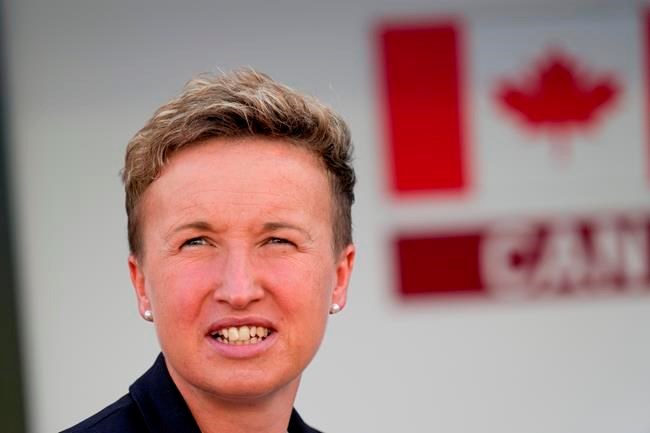Having achieved her goal of Olympic soccer gold, coach Bev Priestman says her sights are now set on success at the World Cup.
Canada has won bronze, bronze and gold at the last three Olympics, but did not make it out of the round of 16 at the 2019 World Cup in France —ousted by Sweden, the team it beat in the Olympic final. The Canadians' best finish at the World Cup was fourth in 2003.
Priestman wants to ensure the gold medal from Tokyo is not a one-off.
"Fresh on my mind at the moment is the World Cup and how this team probably has done very well at Olympic Games historically, but not necessarily at World Cups — and examining why," she told a virtual availability Thursday. "We've got to get ourselves in a similar position come 2023, knowing that we might have to build and some players might depart the program that have been integral.
"But I definitely think it's now about how we sustain that … All of the little things that can make a major difference. We've got to push now, we can't just rest on that gold medal ... I think it's critical now that we don't just say 'Oh well, we won a gold medal.' We've got to push the players more than ever."
The two tournaments are different beasts, with different size fields and qualification pathways. The Tokyo field was just 12 teams while the 2023 World Cup will feature 32 countries, up from 24 last time out.
Despite the success in Tokyo, the Canadian women will have to evolve, Priestman said.
"I don't think teams win consistently just doing the same things."
Priestman said her team was "spot-on" in adjusting to the tight turnaround of the Olympic schedule, with game preparation and reviews built seamlessly into the timetable. Now the Canadian brain trust has to do that for the World Cup, which comes with more time between games and greater diversity in opponents.
"We have to start moving to operate in that model," she said.
Priestman said she hopes to convince veterans such as Christine Sinclair and Desiree Scott to stay on board. The coach also made a point of thanking the team behind her team, and the coaches that preceded her.
For now, the 35-year-old Priestman is back with her family and enjoying the love.
"It hasn't actually sunk in yet," she said of her team's Tokyo triumph. "I think the more I've been back in Canada, the more real it's felt — people stopping you on the street, paying for your meals when you go out. Just crazy things.
"You know this team is absolutely loved by the Canadian public. I've felt that massively. It just hasn't really sunk in in terms of what we've achieved. Even just calling us Olympic champions, that hasn't sunk in either. I just feel really privileged, happy, overwhelmed with the support we've had."
She hopes that backing will help "support our pathway, to put this group of players and more on Canadian soil regularly, rather than maybe once every four years.
"It just feels like the time is right to go and get an NWSL franchise so that the very best can be playing week-in week-out at home."
Like her players, Priestman believes the time is right for a domestic pro league, which will benefit everyone from players to coaches and officials.
"Now's the time where this spotlight's on this group, I think investors will come forward and we'll see the landscape of this country hopefully change forever. And that's what the motivation was for this particular group. It was like 'Listen we do this, we write a new chapter, a new book on what this means for women's soccer in this country.'"
She said the Canadian women will go on a victory tour "in the coming months," with dates and locations to be announced later.
"To be able to connect back with our country and play in front of them is going to be really, really special," she said.
---
Follow @NeilMDavidson on Twitter
This report by The Canadian Press was first published Aug. 12, 2021.
Neil Davidson, The Canadian Press



